Ritsumeikan University is a private university in Kyoto, Japan, that traces its origin to 1869. With the Kinugasa Campus (KIC) in Kyoto, and Kyoto Prefecture, the university also has a satellite called Biwako-Kusatsu Campus (BKC) and Osaka-Ibaraki Campus (OIC).

Michel Gustave Édouard Mayor is a Swiss astrophysicist and professor emeritus at the University of Geneva's Department of Astronomy. He formally retired in 2007, but remains active as a researcher at the Observatory of Geneva. He is co-laureate of the 2019 Nobel Prize in Physics along with Jim Peebles and Didier Queloz, and the winner of the 2010 Viktor Ambartsumian International Prize and the 2015 Kyoto Prize.

Tohoku University, or Tohokudai, is a Japanese national university located in Sendai, Miyagi in the Tōhoku Region, Japan. It is informally referred to as Tonpei. Established in 1907, it was the third Imperial University in Japan and among the first three Designated National Universities, along with the University of Tokyo and Kyoto University. Tohoku University is a Top Type university of the Top Global University Project, and since 2020 has been ranked the best university in Japan by Times Higher Education.
Institute of Space and Astronautical Science, or ISAS, is a Japanese national research organization of astrophysics using rockets, astronomical satellites and interplanetary probes which played a major role in Japan's space development. Since 2003, it is a division of Japan Aerospace Exploration Agency (JAXA).

Hosei University is a private university based in Tokyo, Japan.

The Max-Planck-Institut für Astronomie is a research institute of the Max Planck Society (MPG). It is located in Heidelberg, Baden-Württemberg, Germany near the top of the Königstuhl, adjacent to the historic Landessternwarte Heidelberg-Königstuhl astronomical observatory. The institute primarily conducts basic research in the natural sciences in the field of astronomy.
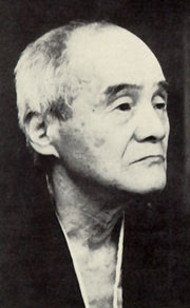
Hajime Tanabe was a Japanese philosopher of science, particularly of mathematics and physics. In 1947 he became a member of the Japan Academy, and in 1950 he received the Order of Cultural Merit.
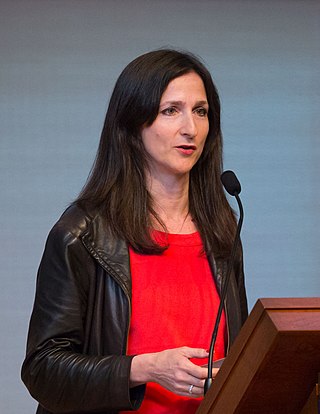
Sara Seager is a Canadian-American astronomer and planetary scientist. She is a professor at the Massachusetts Institute of Technology and is known for her work on extrasolar planets and their atmospheres. She is the author of two textbooks on these topics, and has been recognized for her research by Popular Science, Discover Magazine, Nature, and TIME Magazine. Seager was awarded a MacArthur Fellowship in 2013 citing her theoretical work on detecting chemical signatures on exoplanet atmospheres and developing low-cost space observatories to observe planetary transits.

Kanazawa University is a Japanese national university in the city of Kanazawa, the capital of Ishikawa Prefecture. Founded in 1862, it was chartered as a university in 1949.
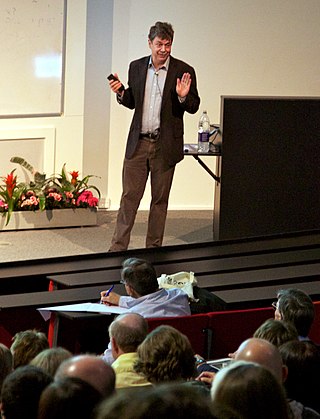
Simon David Manton White, FRS, is a British astrophysicist. He was one of directors at the Max Planck Institute for Astrophysics before his retirement in late 2019.
The National Astronomical Observatories, Chinese Academy of Sciences(NAOC, Chinese: 中国科学院国家天文台; pinyin: Zhōngguó Kēxuéyuàn Guójiā Tiānwéntái) is an astronomical research institute operated by Chinese Academy of Sciences, along with Shanghai Astronomical Observatory, Purple Mountain Observatory and National Time Service Center.
Wuyi University is a public university based in Jiangmen, Guangdong, China.

Kazutoshi Mori is a Japanese molecular biologist known for research on unfolded protein response. He is a professor of Biophysics at the Graduate School of Science, Kyoto University, and shared the 2014 Albert Lasker Basic Medical Research Award with Peter Walter for discoveries concerning the unfolded protein response — an intracellular quality control system that detects harmful misfolded proteins in the endoplasmic reticulum and signals the nucleus to carry out corrective measures.
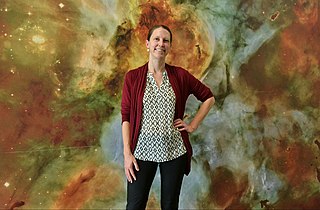
Heather A. Knutson is an astrophysicist and professor at California Institute of Technology in the Division of Geological and Planetary Sciences. Her research is focused on the study of exoplanets, their composition and formation. She won the American Astronomical Society's Newton Lacy Pierce Prize in Astronomy for her work in exoplanetary atmospheres.
Nia Imara is an American astrophysicist, artist, and activist. Imara's scientific work deals with galactic mass, star formation, and exoplanet detection. Imara was the first African-American woman to earn a PhD in astrophysics at the University of California, Berkeley and was the inaugural postdoctoral fellow in the Future Faculty Leaders program at Harvard University. In 2020, Imara joined the University of California, Santa Cruz as an Assistant Professor in the Department of Astronomy.
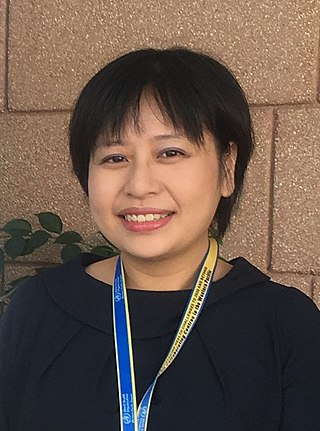
Sherry Moi Meng Ling is a Malaysian virologist, currently serving as a professor at the Graduate School of Medicine, the University of Tokyo. Her research focuses on innate immune system to mosquito-borne virus infection and field epidemiology.
Osaka Metropolitan University, abbreviated to OMU, is a Japanese public university that was established through the integration of Osaka City University (OCU) and Osaka Prefecture University (OPU) on 1 April 2022.
Alyson Brooks is an American theoretical astrophysicist and professor at Rutgers University. She uses large-scale simulations to determine how galaxies form.

Faculty of Science (東京大学理学部) is one of the 10 constituent faculties, and Graduate School of Science (東京大学大学院理学系研究科) is one of the constituent 15 graduate schools at University of Tokyo. The faculty and the graduate school operate as one with the exception of mathematics and computer science. Founded in 1877, Faculty of Science is one of the oldest 4 faculties of the University of Tokyo.
Xin Zhou is a Chinese scientist specializing in magnetic resonance imaging. He is currently serving as president of the Innovation Academy for Precision Measurement Science and Technology of the Chinese Academy of Sciences since July 2022.












